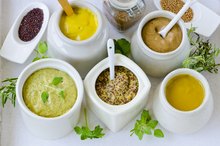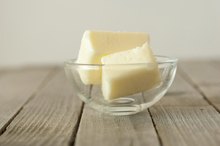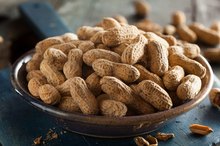What does fact checked mean?
At Healthfully, we strive to deliver objective content that is accurate and up-to-date. Our team periodically reviews articles in order to ensure content quality. The sources cited below consist of evidence from peer-reviewed journals, prominent medical organizations, academic associations, and government data.
- Harvard School of Public Health: Carbohydrates and the Glycemic Load
- The Journal of Clinical Endocrinology and Metabolism: Consumption of Fructose and High Fructose Corn Syrup Increase Postprandial Triglycerides, LDL Cholesterol, and Apolipoprotein-B in Young Men and Women
- The Journal of Clinical Endocrinology and Metabolism: Consumption of Fructose and High Fructose Corn Syrup Increase Postprandial Triglycerides, LDL Cholesterol, and Apolipoprotein-B in Young Men and Women
- American Heart Association: Cooking for Lower Cholesterol
- American Heart Association: Sugars and Carbohydrates
- Harvard School of Public Health: How Sweet Is It?
- American Heart Association: Sodium
The information contained on this site is for informational purposes only, and should not be used as a substitute for the advice of a professional health care provider. Please check with the appropriate physician regarding health questions and concerns. Although we strive to deliver accurate and up-to-date information, no guarantee to that effect is made.
List of High-Carb Foods to Avoid
Carbohydrates are found in a variety of foods. Avoid consuming carbs that contain added sugar or a high amount of fat or sodium. These carbohydrates are high glycemic 1. This means that they have a large impact on your blood sugar response, which can be detrimental to your health. According to several large-scale studies by Harvard Medical School, consuming a high-glycemic diet can increase your risk for Type 2 diabetes and cardiovascular disease.
Avoid Added Sugar
Too much added sugar can lead to weight gain, which is a risk for heart disease and Type 2 diabetes. Added sugar may appear on the ingredient list of a food as sugar, molasses or syrup, or as sucrose, maltose or other names ending in "ose." Two forms of added sugar, fructose and high-fructose corn syrup, can actually increase your cholesterol and triglycerides, which are risks for heart disease. Sweetened beverages, such as soda, may contain high-fructose corn syrup and up to 40 grams of sugar in one serving. Avoid sweetened beverages, candy and other sweetened foods, which may include:
- bakery items
- cereals
- granola bars
- peanut butter
- pickles
- dressings
- condiments
- Too much added sugar can lead to weight gain, which is a risk for heart disease and Type 2 diabetes.
- Sweetened beverages, such as soda, may contain high-fructose corn syrup and up to 40 grams of sugar in one serving.
Avoid Refined Grains
What Can I Eat on a No Carb Diet?
Learn More
Refined grains are not whole grains, as they have had most of the fiber, vitamins and minerals removed during processing. They provide calories with few if any nutrients. Refined grains include white rice, and they are used to make white-flour cakes, pastas and breads; they are missing a lot of important nutrients. For example, 1 cup of steamed white rice and 1 cup of cooked brown rice have about 200 calories and 45 carbs each, but white rice has less protein, iron, calcium and B vitamins than brown rice.
- Refined grains are not whole grains, as they have had most of the fiber, vitamins and minerals removed during processing.
Avoid Fried and Salty Carbs
The American Heart Association recommends that you avoid fried foods and consume less than 1,500 milligrams of sodium daily to reduce your risk for cardiovascular disease 456. Fried-carb foods are high in fat and can lead to high cholesterol and weight gain, while carb foods that are high in sodium can lead to high blood pressure. Carb foods to avoid include canned or instant soups and pastas, snack foods such as potato chips, and fast-food items such as French fries. These foods may be high in fat or sodium, or both. For example, one medium-sized fast-food order of French fries may contain around 20 grams of fat and 300 milligrams of sodium.
- The American Heart Association recommends that you avoid fried foods and consume less than 1,500 milligrams of sodium daily to reduce your risk for cardiovascular disease 4.
- Fried-carb foods are high in fat and can lead to high cholesterol and weight gain, while carb foods that are high in sodium can lead to high blood pressure.
Portion Awareness
How Many Calories in Carrot Sticks?
Learn More
You do not have to completely eliminate added sugar, fried foods, refined grains and salty foods from your diet, but you should make a conscious effort to avoid them by making healthier choices. To satisfy a sweet craving, have a serving of a food containing natural sugar, such as an orange. Choose whole grains over refined grains -- for example, eat 100 percent whole wheat bread instead of white bread. Choose foods that are fresh rather than those preserved with high amounts of sodium. Instead of frying foods, eat them raw, steamed, grilled or baked. For example, have steamed vegetables or a side salad instead of French fries or potato chips.
- You do not have to completely eliminate added sugar, fried foods, refined grains and salty foods from your diet, but you should make a conscious effort to avoid them by making healthier choices.
- To satisfy a sweet craving, have a serving of a food containing natural sugar, such as an orange.
Related Articles
References
- Harvard School of Public Health: Carbohydrates and the Glycemic Load
- U.S. Department of Agriculture: Food Search
- The Journal of Clinical Endocrinology and Metabolism: Consumption of Fructose and High Fructose Corn Syrup Increase Postprandial Triglycerides, LDL Cholesterol, and Apolipoprotein-B in Young Men and Women
- American Heart Association: Eat This, Not That: Healthy Food Options
- American Heart Association: Cooking for Lower Cholesterol
- American Heart Association: Sugars and Carbohydrates
- Harvard School of Public Health: How Sweet Is It?
- American Heart Association: Sodium
- Diabetes mellitus: The epidemic of the century
- Approaching pre-diabetes - PubMed
- FoodData Central
- FoodData Central
- FoodData Central
- Sugar-Sweetened Beverage but Not Diet Soda Consumption Is Positively Associated with Progression of Insulin Resistance and Prediabetes
- Added Fructose - Mayo Clinic Proceedings
- Fructose and sugar: A major mediator of non-alcoholic fatty liver disease - Journal of Hepatology
- Consuming fructose-sweetened, not glucose-sweetened, beverages increases visceral adiposity and lipids and decreases insulin sensitivity in overweight/obese humans
- Consumption of fructose-sweetened beverages for 10 weeks reduces net fat oxidation and energy expenditure in overweight/obese men and women
- Trans fatty acids in diets act as a precipitating factor for gut inflammation? - Okada - 2013 - Journal of Gastroenterology and Hepatology - Wiley Online Library
- Role of free fatty acids in endothelial dysfunction | Journal of Biomedical Science | Full Text
- Metabolic Implications of Dietary Trans‐fatty Acids - Dorfman - 2009 - Obesity - Wiley Online Library
- Trans fatty acids, insulin resistance and diabetes | European Journal of Clinical Nutrition
- Trans fatty acid intake is associated with insulin sensitivity but independently of inflammation
- Trans Fat | FDA
- Small Entity Compliance Guide: Trans Fatty Acids in Nutrition Labeling, Nutrient Content Claims, and Health Claims | FDA
- Dietary Carbohydrate (Amount and Type) in the Prevention and Management of Diabetes | Diabetes Care
- Prediction of the Relative Blood Glucose Response of Mixed Meals Using the White Bread Glycemic Index | Diabetes Care
- The postprandial glucose response to some varieties of commercially available gluten-free pasta: a comparison between healthy and celiac subjects - PubMed
- Diabetes, Depression, and Cognition: a Recursive Cycle of Cognitive Dysfunction and Glycemic Dysregulation | SpringerLink
- Impact of Dietary Fiber Consumption on Insulin Resistance and the Prevention of Type 2 Diabetes | The Journal of Nutrition | Oxford Academic
- FoodData Central
- FoodData Central
- FoodData Central
- Impact of yogurt on appetite control, energy balance, and body composition | Nutrition Reviews | Oxford Academic
- Yogurt and Diabetes: Overview of Recent Observational Studies | The Journal of Nutrition | Oxford Academic
- High-Protein Breakfast Induces Greater Insulin and Glucose-Dependent Insulinotropic Peptide Responses to a Subsequent Lunch Meal in Individuals with Type 2 Diabetes | The Journal of Nutrition | Oxford Academic
- FoodData Central
- FoodData Central
- Caffeinated and Decaffeinated Coffee Consumption and Risk of Type 2 Diabetes: A Systematic Review and a Dose-Response Meta-analysis | Diabetes Care
- Effects of carbohydrates on satiety: differences between liquid and solid food - PubMed
- [Relationship between sugary drinks and diabetes of adults in Wuhai city] - PubMed
- Caramel Frappuccino® Blended Beverage: Starbucks Coffee Company
- Iced Starbucks® Blonde Vanilla Latte: Starbucks Coffee Company
- FoodData Central
- FoodData Central
- FoodData Central
- FoodData Central
- Consumption of Honey, Sucrose, and High-Fructose Corn Syrup Produces Similar Metabolic Effects in Glucose-Tolerant and -Intolerant Individuals | The Journal of Nutrition | Oxford Academic
- FoodData Central
- FoodData Central
- FoodData Central
- FoodData Central
- FoodData Central
- Food label accuracy of common snack foods - Jumpertz - 2013 - Obesity - Wiley Online Library
- FoodData Central
- FoodData Central
- FoodData Central
- Fruit juice: just another sugary drink? - PubMed
- FoodData Central
- FoodData Central
- Advanced Glycation End Products, Inflammation, and Chronic Metabolic Diseases: Links in a Chain? - PubMed
- Effects of cooking method, cooking oil, and food type on aldehyde emissions in cooking oil fumes - PubMed
- Fried Food Consumption and Cardiovascular Health: A Review of Current Evidence
- Consumption of Fried Foods and Risk of Heart Failure in the Physicians' Health Study
- Consumption of fried foods and risk of coronary heart disease: Spanish cohort of the European Prospective Investigation into Cancer and Nutrition study
- Consumption of deep-fried foods and risk of prostate cancera,b
Writer Bio
Jamie Yacoub is a clinical outpatient Registered Dietitian, expert in nutrition and author of her cookbook "Modern Guide to Food and Eating: Low Glycemic Recipes". She obtained a Bachelor of Science in clinical nutrition from UC Davis and an MPH in nutrition from Loma Linda University. Yacoub then completed her dietetic internship as an intern for a Certified Specialist in sports nutrition and at a top-100 hospital.









